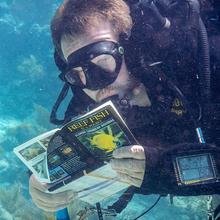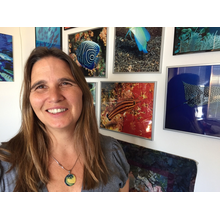Join us to learn more about a variety of marine life topics from our engaging guest speakers at REEF Fest 2019!
Seminars are free and open to the public, but pre-registration is requested. All seminars are held at the Murray Nelson Government Center (102050 Overseas Hwy. Key Largo, FL 33037.) Please see the detailed schedule below for dates and times.
Seminar Schedule
Thursday, Oct. 17, 7:30 pm:
“The Future for Sea Turtles on a Warming Planet”
Presented by Selina Heppell, Ph.D., Professor, Oregon State University
Sea turtle conservation is a remarkable success story worldwide. While some populations continue to decline, many have increased, thanks to international cooperation and the dedicated work of beach volunteers, agencies, scientists, industry, and conservation groups. However, our achievements in sea turtle conservation are challenged by rising sea levels and rising beach temperatures, as well as continued risk of oil spills and plastic pollution. Dr. Heppell will discuss these successes and challenges, and what we can do to help these iconic animals avoid extinction on a rapidly changing planet.
Friday, Oct. 18, 2:30 pm:
"Fishwatchers’ Notebook: Stories and images of great finds and fun adventures”
Presented by Jeff Haines and Carol Cox
During this storytelling session, Jeff and Carol, both avid underwater photographers and REEF Expert surveyors, will share the magic of visiting the same place over and over and how it can change your perspective on doing surveys. They will show some of their most favorite finds during their decade of fishwatching around Florida and the world.
3:30 pm:
“The Power of Marine Citizen Science”
Presented by Ben Holt, Ph.D., Director of the Rock Pool Project
Studying our natural world is far from easy. The sheer diversity, complexity and scale of life on Earth represents major challenges as we endeavor to understand how and why natural systems change from place to place and from time to time. This is particularly true for the marine environment. As concerns regarding human impact on our world reach new extremes, it is vital that professional scientists reach out to the wider community, not just to raise awareness but also to involve people throughout society in the study of biodiversity. Ben will discuss his personal relationship with the world of marine citizen science, his PhD research using REEF data to consider the evolution of hamlet fish (Genus: Hypoplectrus), his research considering the effectiveness of citizen science protocols in the study of biodiversity, his analysis of the REEF database to find environmental factors associated with Caribbean fish biodiversity, and finally his recent UK based marine citizen science program, The Rock Pool Project.
4:30 pm:
“Reef Fish Behavior, 2nd Edition: Twenty joy-filled years in the making”
Presented by Ned and Anna DeLoach, REEF Trustees, Co-founders, and Renowned Underwater Photographer and Videographer
REEF is happy to announce that Ned and Anna will introduce their long-awaited second edition Reef Fish Behavior—Florida, Caribbean, Bahamas at REEF Fest 2019. The couple will share tales of their trials, tribulations, delights, and successes during their 20-year quest to better understand the natural history of reef fishes inhabiting the waters of the Caribbean.
REEF Fest 2019 attendees will have a unique opportunity to purchase a signed copy of the new, updated, and enlarged 2nd edition during two special booking signing events throughout the weekend. These book signing events are the only way to purchase a copy of the book before its release later this year! The book retails for $49.95 plus tax. A limited number of copies will be available for purchase during the Open House at REEF Headquarters (Friday, Oct. 18 from 6:30 -9:00 pm), and on Saturday, Oct. 19 from 1:30-2:30 pm at the Murray Nelson Government Center.
Saturday, Oct. 19, 2:30 pm:
“Blooms of Blue-green Algae in South Florida: Ecological causes and human health consequences”
Presented by Larry Brand, Ph.D., Professor, Rosenstiel School of Marine and Atmospheric Science, University of Miami
In recent years, algal blooms have become more frequent and are a cause of concern in coastal communities. Dr. Brand will discuss the algal blooms that are plaguing south Florida ecosystems and human health. He will explore the sources of nitrogen and phosphorus that generate the blooms, and show how the toxins from these algae can enter the food chain through local seafood.
3:30 pm:
“Lionfish and Nassau Grouper: A tale of two fish and how stakeholder collaboration leads to conservation success”
Presented by Christy Pattengill-Semmens, Ph.D., and Alli Candelmo, Ph.D., REEF Director of Science and REEF Invasive Species Program Manager, and Brice Semmens, Ph.D., Scripps Institution of Oceanography
REEF staff, Christy and Alli, will share recent findings from two of REEF’s conservation science programs, the Invasive Species Program and the Grouper Moon Project, including what we have learned about the target species, the invasive Indo-Pacific Lionfish and the native Nassau Grouper. They will also discuss lessons learned from these projects on the importance of stakeholder engagement and partner collaboration in long-term impact and success.
4:30 pm:
“Marine Heatwaves: What 5,000 citizen scientists can tell us about 85,000 beached birds”
Presented by Julia Parrish, Ph.D., Professor, University of Washington and Executive Director of COASST
Recent research has highlighted that the frequency and magnitude of animal mass mortality events have increased over the last half a century, and that mortality events are likely to become more frequent with an increasingly variable climate. Since 2014, the North Pacific has experienced 7 seabird mass mortality events, resulting in millions of dead birds. The relationship between elevated sea temperatures and the observed effects on seabirds has been poorly understood. Dr. Parrish will present findings from a citizen science program focused on beached birds (COASST) that is shedding light on these patterns, as well as discuss the value citizen science has in these big ocean problems and what motivates members of the public to participate in such programs.
Speaker Bios









